It’s a stunning day on the water’s edge at Lyttelton Port, as gulls’ squarks break through the crisp air.
And there’s a man at the helm of the port’s parent company.
He’s one of the many men in menopause.
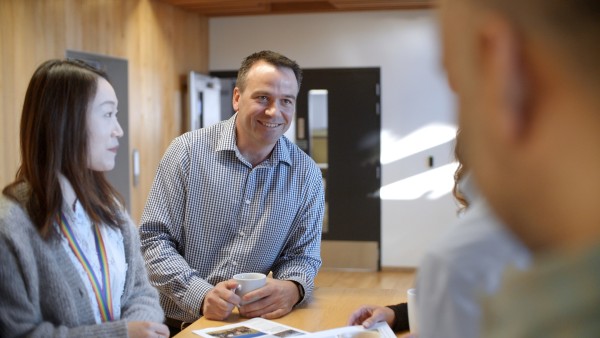
Matthew Slater is the Chief Executive of Christchurch City Holdings Ltd, and he’s leading a team creating pathways to support women in CCHL’s workplaces.
“I see this as a great opportunity to bring a topic like menopause out to the front. Just to make it easier, whether as an employer, a boss, a colleague to provide support for people that they might need.”
Care as a collective at CCHL
CCHL owns a portfolio of Canterbury-based council-controlled trading organisations — “whether it's the port, the airport, the electricity lines company, the fibre optic cables, parks and water services, and our transfer depots for our waste,” Matthew Slater lists off.
“There's absolute power in the collective of the CCHL group coming together. It's just efficient to get experiences from different people and from different walks of life coming together in a comfortable environment.”
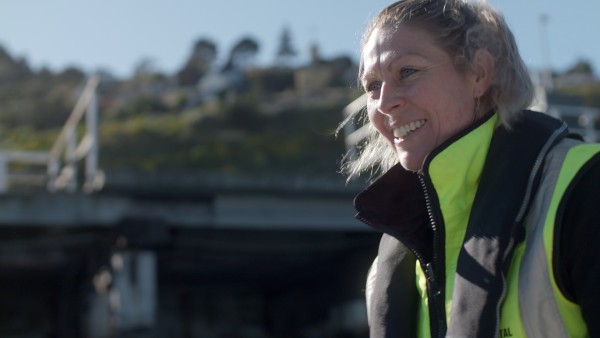
Our host at Lyttelton Port Company is Kirsty Brennan. She’s an Environmental and Sustainability Business Partner and she’s on the women’s network.
Kirsty agrees that learning together and supporting women as a collective is CCHL’s strong suit.
“We don't need to reinvent the wheel on this. It starts with one organisation really breaking the mould and starting with something, and then with the realisation with the other organisations that actually, it's not that difficult,” Kirsty explains.
Kirsty was one of the people who help design menopause journey guidance packs for both leaders and women in CCHL workplaces.
Staying shipshape at Lyttelton Port
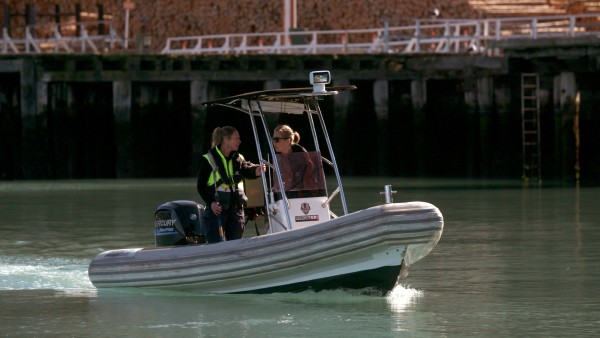
Kirsty, back from taking water testing samples in the port, talks to us about the women’s network as well as how the port is making menopause work.
“What was really surprising was that these confident, competent women were feeling embarrassed at the symptoms that they were experiencing at work,” says Kirsty, referring to in-depth insights the network received from staff.
Next, came action.
“The first thing was to have information easily accessible by everyone about what symptoms are generally experienced during perimenopause, what to look out for.”
“The second thing was what access can we get through our workplace to support us through times when they're tough.”
“And then the third thing was to raise awareness more broadly and so we can talk to our managers, talk to our people leaders and not feel embarrassed.”
Kirsty says the most tangible things the port did was put menopause posters around the office, to ensure people realise it’s “not a big deal to talk about.”
Medical support is on hand from doctors and nurses too.
About her own experience, Kirsty says “I am just starting in my journey towards the big menopause and I was surprised at how little that I actually know about what's to come. I just wanted to know more, to learn more and actually understand what that means for being at work, being a mum, being a partner.”
Breaking stigma & building manaakitanga at Citycare Property
We head to Citycare Property to meet with Lee Gardiner (Ngāti Tuwharetoa). Lee is the Chief Operating Officer | Pou Whakahaere Mahi Tika.
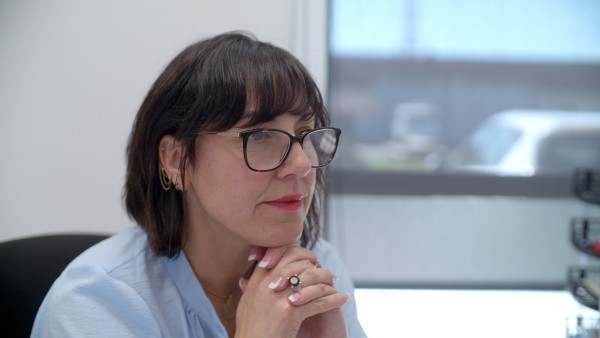
“Hopefully organisations have the trust where women feel like they can talk to their leaders or their managers about the experiences that they're having and what they're going through.”
Lee has her own experience.
“There are a number of women going through really challenging times in that time of our life. And that we need to recognise those times and make accommodations for them.”
“My own personal journey was pretty harrowing.”
“I've shown up at executive tables for many years now and often the only female around the table.”
“I endured blood transfusions and iron transfusions and [medical professionals] would say, ‘I'm surprised that you're even standing up.’ Let alone attending board meetings, let alone travelling around the country and doing all your regular things that you need to do as an executive leader.”
Lee now feels empowered — and te ao Māori is her grounding.
“I feel stronger in myself than I ever have before.”
“Te ao Māori has a really beautiful concept around menopause. It's seen as a really positive thing in te ao Māori. It's about women coming into their own power, stepping into their leadership,” says Lee proudly.
Citycare property helps its staff in a number of ways.
It has period products in the bathrooms for easy access.
It has “caught short packs” for women in utes and trucks or in the field — a small envelope with period products and chocolate. As Lee puts it, for that “rubbish time of the month.”
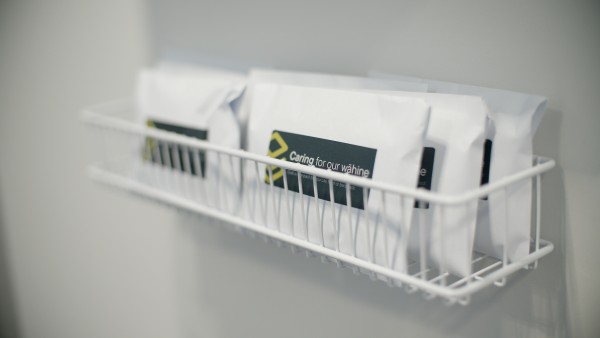
Powering up at Orion
Orion had a spark and is now super-charging its support of women. It is the electricity network for central Canterbury.
It’s the third stop and final stop of the day.
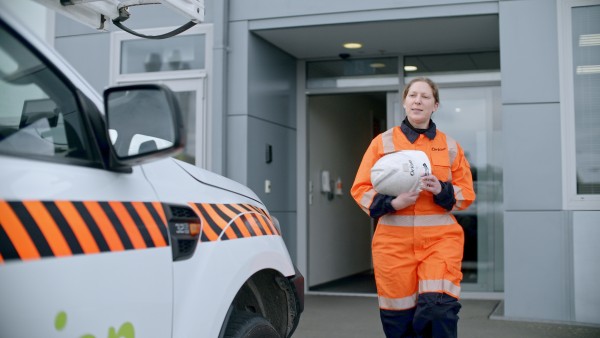
“One of the things that came through from our women's network was a bit of an open discussion around menopause,” says Quality, Health and Safety Manager Sacha Montgomery.
“It's a great opportunity to break some of those taboos. It's about giving people flexibility because we never actually know what any individual is going to need on any particular day.”
Kitted out in her own bright overalls, Sacha talks about the added challenges for women in usually restrictive safety clothing, and for those working long hours and shift work.
“There's always the ability for us to swap out clothing if needed. And we have female cuts as well, which just allow people a bit more room and flexibility, a bit more comfort.”
Referring to needing bathrooms at short notice, Sacha talks to another tangible — and meaningful — action Orion has organised for staff.
“We have sites around the city, where our keys give us access to those sites 24/7. So, for our operators out in the field, there are various locations they can go at any time, so they're not isolated to just their vehicle.”
Orion is also ensuring men have an opportunity to learn about their role in menopause journeys.
“We've actually had feedback from some of our colleagues that they've been able to go home and have a conversation with their wives at a more empathetic level than they would have been able to and with a bit of confidence. And as a result, their wives have felt much more comfortable about having a conversation about what they're going through.”
People power to drive pause-itivity
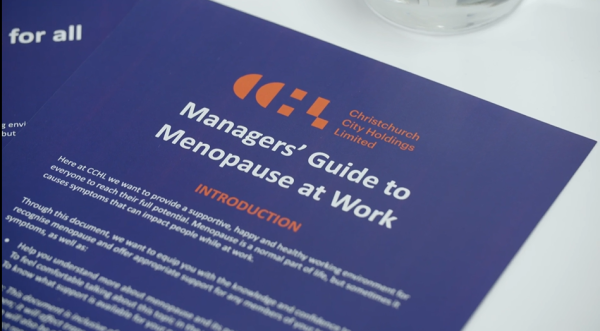
Back at our portside chat, CCHL CEO Matthew Slater grounds this work in reality – making sure it’s business-as-usual.
“This isn't about throwing a whole lot of money at a big program of work.”
“It’s actually quite straightforward.”
“That might mean talking about menopause one day, it might be talking about mental health another day.
He says it’s “an understanding of people's challenges, that creates a workplace where that can be a help not a hindrance in people's work life and personal life. You know, make things easier.”
